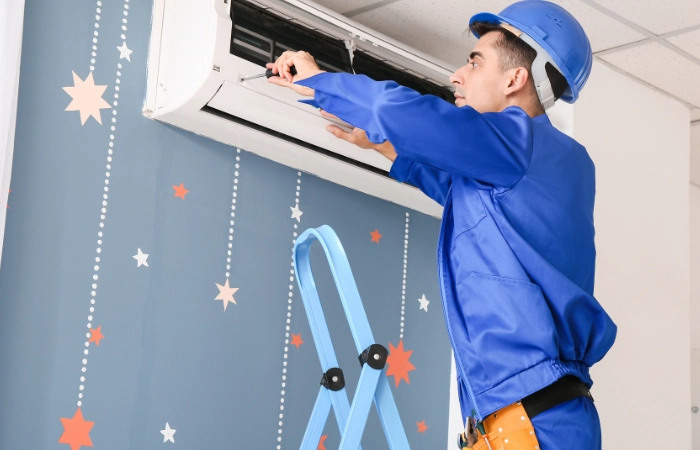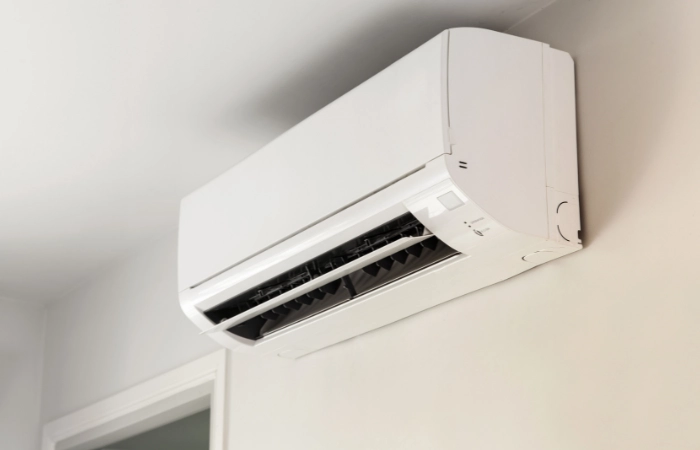Are you considering an upgrade to your home or office cooling system? Choosing the right air conditioning can be pivotal for both comfort and cost-effectiveness. Among the various options available, split system air conditioning stand out due to their efficiency, flexibility, and ease of installation. Ideal for locations without ductwork, these systems offer a practical solution that fits well into both residential and commercial settings.
In this article, we will delve into the numerous benefits of installing a split system air conditioning unit, highlighting how it can enhance your indoor environment while also being kind to your wallet and the planet.
What Is a Split System Air Conditioning?
A split-system air conditioner is a cooling system comprising two main components: an outdoor unit and an indoor unit. The outdoor unit includes the compressor and condenser coil, while the indoor part houses the evaporator coil and air handler. These two units are linked by refrigerant piping. Split systems are popular because they are efficient, relatively quiet, and do not require ductwork, making them easier to install in buildings where duct installation is impractical. For more details on maintaining and cleaning AC coils, you can refer to the guide on AC coil cleaning. This resource provides step-by-step instructions and tips for ensuring your split system air conditioning operates at peak efficiency. They provide effective zone cooling, allowing different rooms to be conditioned separately. This system is suitable for residential, commercial, and office environments.
Benefits of Split Air Conditioning Unit
There are numerous advantages to installing a split system air conditioning unit in your home or business. These systems are designed to offer superior comfort, efficiency, and flexibility compared to traditional window units or central HVAC systems. Here, we explore seven key benefits:
- Energy Efficiency: Split system air conditioning are highly efficient, primarily because they don’t rely on ductwork, which can lead to significant energy losses. These systems use inverter technology, allowing the compressor to adjust its speed based on demand, thus minimizing energy use while maintaining consistent temperatures. This efficiency translates into lower utility accounts and a smaller carbon footprint, making split systems an environmentally friendly choice for temperature control.
- Quiet Operation: Split ACs are remarkably quiet compared to other air conditioning options. The noisiest parts, such as the compressor and condenser, are located outside the building. This separation drastically reduces indoor noise, making split systems ideal for environments where quiet is essential, such as bedrooms, hospitals, and libraries. This feature ensures that comfort does not come at the cost of peace.
- Cost-Effective Installation: Installing split air conditioning systems can be less expensive than installing central air, especially in homes without existing ductwork. The absence of ducts simplifies the installation process, significantly reducing labor and materials costs. Furthermore, split systems can be installed in stages, which allows homeowners to expand cooling capacity as budget and needs dictate rather than incurring a large upfront expense.
- Flexible Installation Options: The versatility of a split air conditioning unit allows them to be installed in various locations without the constraints of ductwork. The indoor part can be mounted on a wall, suspended from a ceiling, or even positioned as a floor-standing model, while the outdoor unit can be set up to 50 feet away. This flexibility is particularly advantageous in older buildings or in rooms where conventional ducted systems would be impractical or too invasive.
- Improved Air Quality: Split AC units are equipped with advanced filtration systems that catch and neutralize airborne pollutants such as pollen, dust, mold spores, and bacteria. This feature particularly benefits individuals with allergies or respiratory issues, as it ensures a cleaner, healthier air environment. Regular AC maintenance and AC filters changes can further enhance this benefit, contributing to overall better indoor air quality. Additionally, the benefits of professional air conditioning installation include optimized system efficiency and prolonged equipment life, essential for maintaining indoor comfort and air quality.
- Individual Zoning Capabilities: One of the standout features of split air conditioning systems is the capability to cool specific zones independently. Each unit can be controlled separately, permitting personalized temperature settings in different rooms. This not only enhances comfort but also raises energy efficiency, as energy isn’t wasted cooling unoccupied spaces. Such zoning capabilities are perfect for multi-room homes or offices, where different occupants might have different cooling needs.
- Aesthetically Pleasing: Unlike bulky window units that can detract from the aesthetic of your space, split air conditioners feature a sleek, modern design that can be easily integrated into any room décor. Available in various styles and sizes, these units offer a discreet alternative that does not compromise the look of your interiors. This makes split ACs particularly appealing for spaces where appearance is as important as functionality.
FAQs about Air Conditioning Split System

What types of buildings are best suited for split system air conditioning installations?
Split system AC installations are ideal for both residential and commercial properties, especially those lacking space for ductwork. This includes older homes, apartments, and buildings where preserving architectural integrity is crucial. Their flexibility allows them to be used effectively in a variety of settings, including individual rooms, additions, or specific areas that require independent cooling.
Can split system air conditioning be used for both cooling and heating?
Yes, many split air conditioners are equipped with heat pump technology, permitting them to provide both cooling and heating. This dual functionality makes them an excellent year-round climate control solution, especially in regions with mild winters. By investing in a heat pump-equipped split system, you can streamline your home’s climate control into one efficient unit.
How does the energy efficiency of split systems compare to other air conditioners?
Split system air conditioning often offer superior energy efficiency compared to traditional window units and older central HVAC systems. By employing advanced inverter technology, these systems adjust their output based on real-time cooling demands, significantly reducing energy consumption and operational costs. For improved air distribution and energy efficiency, strategically use a fan with air conditioning, which helps circulate the cool air more evenly throughout your living spaces.
Can I control my split system air conditioning remotely?
Many modern split system air conditioning are equipped with smart technology, allowing for remote control via smartphones or tablets. This feature provides convenience and enhanced control over your home’s climate, enabling you to adjust settings, turn the system on or off, and monitor energy usage from anywhere, providing both comfort and energy efficiency.
Conclusion
Installing split system air conditioning offers numerous benefits, from energy efficiency and quiet operation to flexible installation options and improved air quality. These systems provide a perfect combination of functionality and aesthetics, making them ideal for residential and commercial spaces requiring effective and efficient temperature control.
Ready to upgrade to a split system air conditioner? Contact us at Tropic Air-Conditioning Inc. today to explore our installation services and enjoy a cooler, more comfortable environment in your home or office. Let us help you make the right option for your cooling needs.




